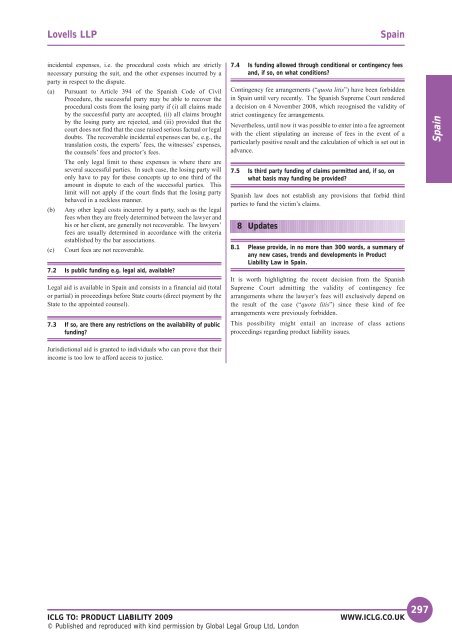Product Liability 2009 - Arnold & Porter LLP
Product Liability 2009 - Arnold & Porter LLP
Product Liability 2009 - Arnold & Porter LLP
You also want an ePaper? Increase the reach of your titles
YUMPU automatically turns print PDFs into web optimized ePapers that Google loves.
Lovells <strong>LLP</strong> Spain<br />
incidental expenses, i.e. the procedural costs which are strictly<br />
necessary pursuing the suit, and the other expenses incurred by a<br />
party in respect to the dispute.<br />
(a) Pursuant to Article 394 of the Spanish Code of Civil<br />
Procedure, the successful party may be able to recover the<br />
procedural costs from the losing party if (i) all claims made<br />
by the successful party are accepted, (ii) all claims brought<br />
by the losing party are rejected, and (iii) provided that the<br />
court does not find that the case raised serious factual or legal<br />
doubts. The recoverable incidental expenses can be, e.g., the<br />
translation costs, the experts’ fees, the witnesses’ expenses,<br />
the counsels’ fees and proctor’s fees.<br />
The only legal limit to these expenses is where there are<br />
several successful parties. In such case, the losing party will<br />
only have to pay for these concepts up to one third of the<br />
amount in dispute to each of the successful parties. This<br />
limit will not apply if the court finds that the losing party<br />
behaved in a reckless manner.<br />
(b) Any other legal costs incurred by a party, such as the legal<br />
fees when they are freely determined between the lawyer and<br />
his or her client, are generally not recoverable. The lawyers’<br />
fees are usually determined in accordance with the criteria<br />
established by the bar associations.<br />
(c) Court fees are not recoverable.<br />
7.2 Is public funding e.g. legal aid, available?<br />
Legal aid is available in Spain and consists in a financial aid (total<br />
or partial) in proceedings before State courts (direct payment by the<br />
State to the appointed counsel).<br />
7.3 If so, are there any restrictions on the availability of public<br />
funding?<br />
Jurisdictional aid is granted to individuals who can prove that their<br />
income is too low to afford access to justice.<br />
ICLG TO: PRODUCT LIABILITY <strong>2009</strong><br />
© Published and reproduced with kind permission by Global Legal Group Ltd, London<br />
7.4 Is funding allowed through conditional or contingency fees<br />
and, if so, on what conditions?<br />
Contingency fee arrangements (“quota litis”) have been forbidden<br />
in Spain until very recently. The Spanish Supreme Court rendered<br />
a decision on 4 November 2008, which recognised the validity of<br />
strict contingency fee arrangements.<br />
Nevertheless, until now it was possible to enter into a fee agreement<br />
with the client stipulating an increase of fees in the event of a<br />
particularly positive result and the calculation of which is set out in<br />
advance.<br />
7.5 Is third party funding of claims permitted and, if so, on<br />
what basis may funding be provided?<br />
Spanish law does not establish any provisions that forbid third<br />
parties to fund the victim’s claims.<br />
8 Updates<br />
8.1 Please provide, in no more than 300 words, a summary of<br />
any new cases, trends and developments in <strong>Product</strong><br />
<strong>Liability</strong> Law in Spain.<br />
It is worth highlighting the recent decision from the Spanish<br />
Supreme Court admitting the validity of contingency fee<br />
arrangements where the lawyer’s fees will exclusively depend on<br />
the result of the case (“quota litis”) since these kind of fee<br />
arrangements were previously forbidden.<br />
This possibility might entail an increase of class actions<br />
proceedings regarding product liability issues.<br />
WWW.ICLG.CO.UK 297<br />
Spain





